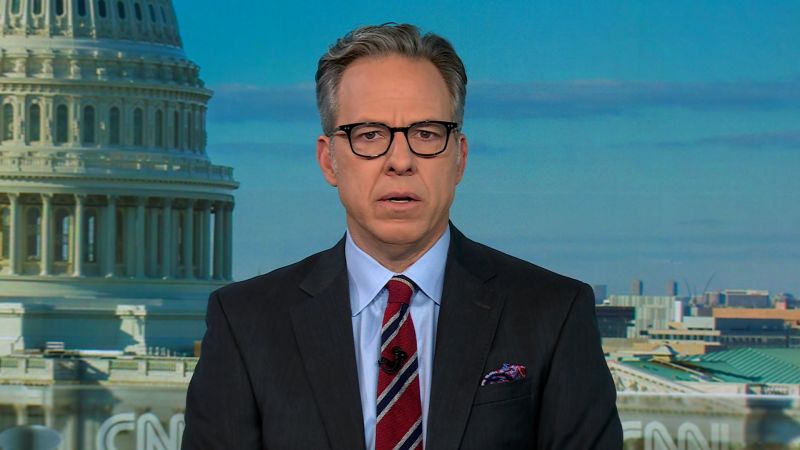Editor’s Note: A version of this article first appeared in the “Reliable Sources” newsletter. Sign up for the daily digest chronicling the evolving media landscape here.
The relentless war between Israel and Hamas has led to a staggering number of civilian deaths and displaced nearly 2 million people in Gaza, spawning an urgent humanitarian crisis. It’s also presented a high-stakes conundrum for the international press as the conflict captures the attention of the world and the line separating fact from fiction remains shrouded in fog. Each and every day, journalists covering the Middle East conflict are faced with thorny challenges, many of which they must grapple with in real-time.
We spoke with CNN’s Jake Tapper on Tuesday for a wide-ranging interview about reporting on the war. Below, you’ll find our unedited Q&A.
What has been the most challenging aspect about reporting on the Israel-Hamas war?
As always, it’s the fog of war. Not knowing exactly what is going on for sure at any given moment, first reports being inadequate, sources for information being biased, the difficulty of knowing what is happening on a battlefield, the near impossibility of getting hard, cold facts in real-time.
As a journalist, how have you balanced the need to show the graphic nature of Hamas’ savage attack, while also knowing your broadcast is being carried on air and that such images can potentially disturb viewers?
This is an issue I struggle with all the time and have been for more than a decade. There’s a page at the beginning of my 2012 book “The Outpost” in which I wrestle with just describing *in print* how graphic to be.
I generally feel that we in the news media writ large, all over the world, censor too much. There is part of me that thinks if we showed more of what war is and what gun violence is and what fentanyl and opioids actually do, the better the journalism we would be providing. But these are fights I lose, and I understand why I lose them. I just don’t think we should pretend that hiding these images is any less of an overt act than showing them.
In any case, what happened on October 7 to the Israelis, and subsequently the hostages, is such an important part of what is going on right now in Gaza, and I think it is important to show the world. The Israelis perceive Hamas to be an existential threat to their survival. Whatever you think of the IDF response, and I am not defending it or prosecuting it, October 7 marked the end of Israel’s containment strategy when it comes to Hamas. And it is part of the story.
And the framing of what happened on October 7 by much of the Arab world, and much of the progressive world in the United States, which in some cases includes outright denialism, is also part of the story. I am reminded of what General Eisenhower said after his decision to invite the news media to witness what the soldiers saw when they began liberating the concentration camps. “I think people ought to know about such things… I think the people ought to know what they are fighting for and the kind of person they are fighting.”
Last week, you published an important — and equally disturbing — story about Israeli police investigating cases of sexual assault committed during Hamas’ assault. The report has touched off a larger conversation in the international community, with some critics noting there has been relatively little attention paid to the topic. Do you believe it deserves more focus?
It’s shocking. The degree to which Hamas terrorists raped and committed sexually violent acts on women and girls on October 7 is hideous, and there is evidence and witnesses to the degradation. It was a very difficult story to do because again it was so graphic and horrifying.
And where is the international women’s community? Where is the U.S. feminist community? Do these girls and women not count as victims for some reason? I wasn’t aware victimhood for rape came with an asterisk.
On the other hand, there have been some critics who believe the news media, broadly speaking, has not been doing an adequate job showing the suffering of the Palestinian people in Gaza. What are your thoughts on such critiques?
I’ve seen a ton of strong coverage that gives glimpses into life in Gaza, but it is incredibly dangerous to be there right now. Journalists have been killed.
The problem as U.S. policymakers explain it is twofold: First and foremost, Hamas staged this brutal attack on Israel on October 7 and ran back into Gaza where they embed within the population. And their spokesmen have been very clear in their public pronouncements that they do not particularly care about the loss of life of Palestinian civilians, and that they have spent money on tunnels for their own safety, that of Hamas fighters, and they consider it the responsibility of the United Nations to protect the Palestinian civilians.
Second, and the Biden administration has been pretty clear about this, in their view Israel is not doing enough to protect civilian casualties during its bombing campaign against Hamas. So thousands of innocent civilians have been killed and it is undeniably horrific.
Journalists are working every day to get into Gaza and safely report stories out, documenting the horrors of war and loss of human life. Because of the factors above, not to mention the near impossibility of getting in and out of Gaza, covering this war has proved challenging compared to, say, Iraq, Afghanistan or Ukraine.
The war has given way to an alarming surge in antisemitism across the globe. As one of the most high-profile Jewish anchors in the world, have you seen a spike in bigoted attacks that target you personally?
My faith only guides my journalism in the sense that I know what it’s like to be a religious minority so I apply that across the board to Muslims, Mormons, Catholics and to everyone else. I don’t assume that because someone is of one particular faith that they have certain views.
That’s about it.
I see the war as a journalist and as a human. I want the human suffering to end now. And I would prefer a world where all peoples can live with democracy and self-determination. This is a time where antisemitism is without a doubt on the rise and I’ve certainly seen an uptick online, but ugly words are just that: words. It’s nothing compared to what the people in Israel and Gaza and the West Bank are currently going through.
More than 50 journalists have now died in the region since the onset of the war, according to the Committee to Protect Journalists. What is your message to the reporters who are risking their lives to deliver this story to the world?
I’ve long lived in awe of folks who risk their lives to cover wars. I’ve been to war zones in Iraq, Afghanistan, Ukraine and Israel, but always taking limited risks. I can’t imagine having anything worthwhile to say to the people who charge into far more dangerous terrain.
Switching gears, I’d be remiss if I didn’t ask you about the Home for Our Troops auction, in which you teamed up with the likes of George Clooney, Wynonna Judd, Don Cheadle and Mindy Kaling to raise money for injured post-9/11 veterans. How did the auction do this year? What was the number one item?
We had a great year, thanks for asking, raising more than $400,000!
And since pretty much all of that goes to building the specially adapted, mortgage free homes for severely injured US veterans — and the team putting the auction together consists pretty much of me annoying celebrities, the fabulous celebrities themselves giving in to my pestering pleadings, and one employee of Homes for Our Troops — it’s a decent accomplishment.
Every year the number one item is different. This year, I thought it was going to be 18 holes of golf with Jason Bateman and Will Arnett at the Bel Air country club but then it ended up being two tickets to the premiere of Jake Gyllenhaal’s next movie. I think that’s gonna be Roadhouse, so no doubt money well spent.
Read the full article here




